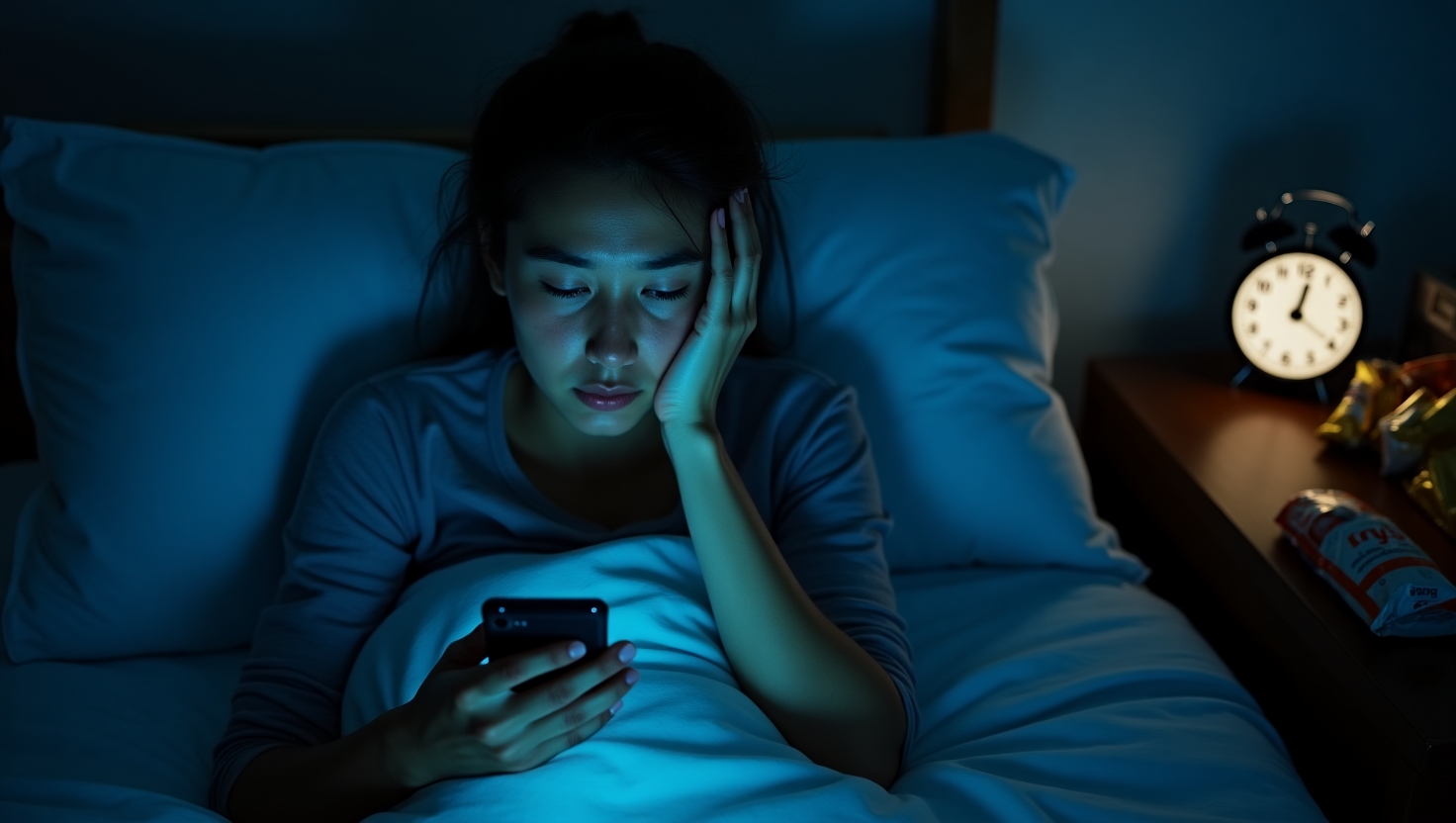You scroll, swipe, binge—and the clock strikes midnight. What seems like harmless late-night screen time could be one of the biggest hormonal disruptors of modern life.
From sleep cycles to testosterone levels, melatonin to cortisol—your entire endocrine system is under silent attack.
Let’s uncover how your late-night screen habits are killing your hormones—and why the consequences go far beyond fatigue.
The Digital Blue Light Bomb
Screens emit blue light, which closely mimics daylight. Under natural circumstances, blue light tells your brain, “It’s daytime—stay alert!”
But at night? This artificial signal throws off your circadian rhythm, leading to:
- Suppressed melatonin (sleep hormone)
- Elevated cortisol (stress hormone)
- Disrupted testosterone and estrogen regulation
- Poor insulin sensitivity and metabolism
This isn’t just about poor sleep. This is hormonal chaos.
Why Melatonin Matters More Than You Think
Melatonin is not just about sleep—it’s also an antioxidant, immune modulator, and tumor suppressor. When late-night screen exposure delays its release:
- You age faster
- Your immune system weakens
- Your risk of cancer and inflammation increases
Table: Hormonal Breakdown of Late-Night Screens
| Hormone | What It Does | What Screens Do to It |
|---|---|---|
| Melatonin | Regulates sleep and aging | Severely suppressed |
| Cortisol | Manages stress and energy | Chronically elevated |
| Testosterone | Supports muscle and libido | Reduced by poor sleep |
| Insulin | Controls blood sugar | Increased resistance |
| Ghrelin & Leptin | Hunger and satiety | Flipped, causing overeating |
The Testosterone Trap (Yes, Even in Women)
Testosterone is crucial for energy, focus, muscle repair, and libido—in both men and women.
But when screens delay sleep and increase stress:
- Testosterone drops
- Estrogen becomes dominant (in men too!)
- Fat storage increases, especially in the belly
- Motivation and drive decline
Your willpower doesn’t fail. Your hormones do.
Are Your Screens Secretly Rewiring Your Hormonal Clock?
Every human has an internal biological clock—the suprachiasmatic nucleus (SCN). It syncs everything from hormone secretion to metabolism.
Late-night screens override this clock, causing:
- Irregular periods
- Hair loss
- Anxiety & depression
- Thyroid dysfunction
- Poor fertility in both men & women
The price of watching that extra reel or Netflix episode could be hormonal imbalance for years.
Can You Reverse the Damage?
Yes—but not by just “sleeping early once in a while.” Here’s how to detox and realign your hormones:
| Solution | How It Helps |
|---|---|
| Blue Light Glasses | Filters harmful wavelengths at night |
| No Screens 2 Hours Before Bed | Allows natural melatonin to rise |
| Red Light Lamps | Calms the brain, promotes rest |
| Magnesium + L-Theanine | Supports sleep & hormone repair |
| Sleep Anchoring (same bedtime daily) | Resets the biological clock |
For Kids & Teens: The Risk Is Greater
Children and teenagers exposed to late-night screens:
- Enter puberty later or earlier
- Develop anxiety and mood swings
- Face long-term fertility risks
- Have higher chances of ADHD, obesity, and poor school performance
The hormonal systems in youth are still forming—and late-night digital habits can damage them permanently.
Final Warning: This Is Not a Phase, It’s a Pattern
Most people won’t notice the effects of hormonal disruption until years later—when they can’t sleep, gain unexplained weight, face hair loss, or feel burned out.
But by then, it’s too late to reverse.
If your phone is the last thing you see at night, and the first thing you reach for in the morning…
Your hormones are no longer under your control.
Conclusion: Reclaim the Night, Reclaim Your Body
Late-night screens aren’t just keeping you awake—they’re disassembling your hormonal foundation. Every notification, every binge episode, every glowing screen is part of a biological war.
The cure? Simplicity.
- Power off.
- Protect your rhythm.
- Let your body heal—before it forgets how.
Is your gut health sabotaging your weight loss journey? Discover how your gut might be the hidden reason you’re not losing weight.
How Late-Night Screens Are Killing Your Hormones – FAQ
Q1: Is blue light really that harmful at night?
Absolutely. Blue light from screens suppresses melatonin, the hormone that tells your body it’s time to sleep. Without enough melatonin, your sleep becomes shallow, irregular, and your body can’t properly repair itself overnight.
Q2: What happens to my cortisol levels when I use screens at night?
Late-night screen exposure keeps cortisol, your stress hormone, unnaturally high. Instead of winding down, your body stays alert — leading to poor sleep, increased anxiety, and even belly fat accumulation.
Q3: Can screens really mess with reproductive hormones?
Yes. Poor sleep and disrupted circadian rhythms impact the balance of key reproductive hormones like testosterone and estrogen, leading to mood swings, low libido, and menstrual irregularities.
Q4: Why do I feel more hungry after staying up late on my phone?
Screen-induced sleep disruption raises ghrelin (your hunger hormone) and lowers leptin (your fullness hormone). This imbalance leads to late-night cravings and weight gain — even if you’re not truly hungry.
Q5: Is it just sleep that’s affected, or is it deeper?
It’s much deeper. Chronic exposure to blue light at night disrupts your entire endocrine system — from thyroid function to insulin regulation — silently rewiring your body’s natural hormonal rhythms over time.

